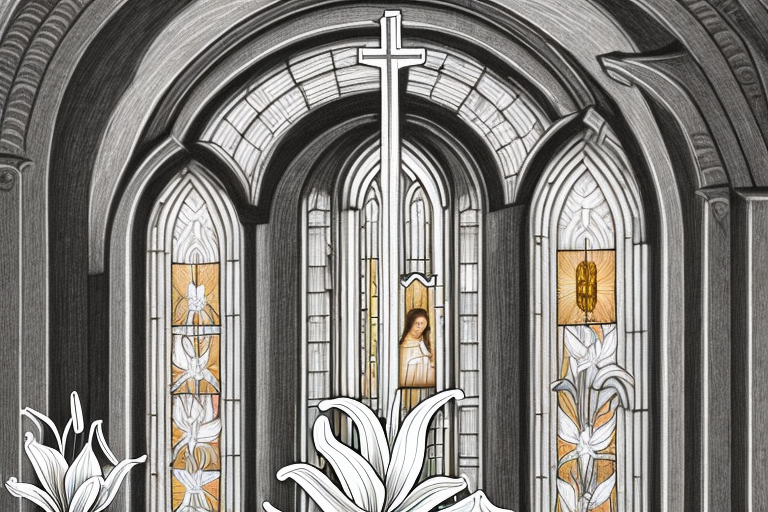What is the Season of the Annunciation and Why Does the Catholic Church Celebrate It?

The season of the Annunciation is an essential event in the Catholic Church's liturgical calendar. Celebrated on March 25th each year, it commemorates the announcement made by the Angel Gabriel to the Virgin Mary that she would conceive and give birth to the Son of God, Jesus Christ. This solemn season holds great theological and historical significance for Catholic Christians worldwide.
Understanding the Season of the Annunciation
The season of the Annunciation has its origins in the Bible, specifically the Gospel of Luke. The biblical account recounts how the Angel Gabriel appeared to Mary in the town of Nazareth, declaring her to be favoured by God and chosen to be the mother of Jesus. This extraordinary event marks the beginning of the Incarnation, the moment when God became human.
The Annunciation is significant in Christianity as it represents the fulfilment of ancient prophecies and the unfolding of God's plan of redemption for humanity. It signifies the divine intervention in human history and sets the stage for the birth, life, death, and resurrection of Jesus Christ.
As we delve deeper into the season of the Annunciation, it is important to understand the historical and cultural context in which this event took place. Nazareth, the town where Mary resided, was a small village in Galilee, a region known for its agricultural activities and close-knit communities. It was in this humble setting that the Angel Gabriel appeared to Mary, bringing her the news that would forever change the course of human history.
The choice of Mary as the mother of Jesus was not a random occurrence but a carefully orchestrated plan by God. Mary, a young and devout Jewish woman, was known for her unwavering faith and obedience to God's will. Her acceptance of Gabriel's message, despite the potential societal consequences, is a testament to her deep trust in God and her willingness to play a pivotal role in His divine plan.
The season of the Annunciation is celebrated on March 25th, exactly nine months before Christmas, symbolising the conception of Jesus in Mary's womb. This date holds great significance as it aligns with the Jewish belief that prophets died on the same day they were conceived. Thus, the season of the Annunciation not only commemorates the announcement of Jesus' impending birth but also honours the prophets who came before Him.
Throughout history, the season of the Annunciation has been celebrated in various ways across different cultures and traditions. In some Christian denominations, it is a major season day, marked by special church services and processions. In others, it is a more subdued observance, with individuals and families reflecting on the significance of Mary's role in salvation history.
One of the most iconic representations of the Annunciation can be found in art. Countless artists, from Renaissance masters to contemporary painters, have depicted this momentous event in their works. These artworks not only capture the beauty and awe of the Annunciation but also serve as a visual reminder of the profound impact it had on human spirituality and the art world.
As we celebrate the Feast of the Annunciation, let us reflect on the profound message it conveys. It reminds us of God's boundless love for humanity, His willingness to enter into our world, and the transformative power of faith. May this feast day inspire us to embrace God's plan for our lives, just as Mary did, and to be open to the miraculous possibilities that lie ahead.
The season of the Annunciation in the Catholic Liturgical Calendar
The Feast of the Annunciation is observed on March 25th every year. This date holds special significance as it falls exactly nine months before the celebration of the birth of Jesus on December 25th. The timing of the feast also coincides with the spring equinox, symbolising the renewal of life and the coming of light into the world.
According to Christian tradition, the Feast of the Annunciation commemorates the angel Gabriel's visit to the Virgin Mary, announcing that she would conceive a child by the Holy Spirit. This event is described in the Gospel of Luke, where Mary humbly accepts her role as the mother of Jesus, saying, "Behold, I am the handmaid of the Lord; let it be to me according to your word."
The Feast of the Annunciation holds great significance in the Catholic liturgical calendar. It is a celebration of the Incarnation, the moment when God became human and entered into the world. This event marks the beginning of the salvation story, as it is through Jesus' birth that humanity is offered the opportunity for redemption and eternal life.
While March 25th is designated as the feast day, it may be transferred to another day if it falls during Holy Week or the octave of Easter. This is to ensure that the solemnity of Holy Week is not overshadowed by other celebrations. The Catholic Church recognises the importance of each liturgical season and seeks to maintain the appropriate focus and reverence during these sacred times.
During the Feast of the Annunciation, Catholics around the world gather in churches to participate in special Masses and prayers. The liturgy for this feast often includes readings from the Gospel of Luke, highlighting the angel Gabriel's visit to Mary and her response of faith. The homilies delivered by priests and deacons during these Masses delve into the theological significance of the Incarnation and its implications for the faithful.
Additionally, the Feast of the Annunciation is a time for Catholics to reflect on the virtues of Mary, particularly her obedience and humility. Mary's "yes" to God's plan of salvation serves as a model for all believers, encouraging them to trust in God's will and respond with faith and surrender.
Throughout history, the Feast of the Annunciation has been celebrated with various customs and traditions. In some cultures, it is customary to decorate churches and homes with flowers and greenery, symbolising new life and the beauty of God's creation. Others may engage in acts of charity and service, following Mary's example of selflessness and compassion.
Overall, the Feast of the Annunciation is a joyous occasion for Catholics, as it reminds them of the incredible love and mercy of God. It invites believers to contemplate the mystery of the Incarnation and to deepen their relationship with Jesus, who took on human flesh to save humanity from sin and death.
The Theological Importance of the Feast of the Annunciation
The Feast of the Annunciation holds immense theological significance within Catholicism. It marks the moment when Jesus, the Son of God, took on human flesh and entered the world through the Virgin Mary. This event is pivotal in understanding the mystery of the Incarnation.
The Annunciation highlights the divine plan of salvation and the unique role of Mary as the Mother of God. In accepting the Angel Gabriel's message with faith and humility, Mary becomes an exemplary figure of obedience and trust in God's will. Her consent to become the mother of Jesus demonstrates her pivotal role in salvation history.
As we delve deeper into the theological significance of the Feast of the Annunciation, we come to appreciate the profound implications it has for our understanding of God's love and mercy. The Incarnation, which is at the heart of this feast, reveals God's desire to intimately connect with humanity. By taking on human flesh, Jesus demonstrates God's willingness to enter into our human experience, to share in our joys and sorrows, and to ultimately redeem us from sin.
Furthermore, the Annunciation emphasises the importance of Mary's fiat, her "yes" to God's plan. In her response to the Angel Gabriel, Mary shows us what it means to surrender our own will to God's will. Her obedience and trust serve as a model for all believers, inviting us to submit ourselves to God's divine plan for our lives.
Moreover, the Feast of the Annunciation brings to light the unique role of Mary as the Mother of God. Through her "yes" to God, she becomes the vessel through which God enters the world. Mary's cooperation with God's plan demonstrates her deep faith and her willingness to be an instrument of God's love and salvation.
Additionally, the Annunciation reminds us of the importance of the human person in God's plan of salvation. By choosing to enter the world through a human mother, God affirms the dignity and worth of every human being. The Incarnation reveals that God values and cherishes humanity and that each person has a role to play in the divine plan.
Furthermore, the Feast of the Annunciation invites us to reflect on the mystery of time and eternity. In this moment, the eternal God enters into human history, bridging the gap between the temporal and the eternal. The Incarnation reminds us that God is not distant or detached but intimately present in every moment of our lives.
In conclusion, the Feast of the Annunciation holds immense theological importance within Catholicism. It reveals the divine plan of salvation, highlights the unique role of Mary as the Mother of God, and invites us to reflect on the profound implications of the Incarnation. This feast calls us to embrace Mary's obedience and trust, recognise the dignity and worth of every human, and contemplate the mystery of God's presence in our lives. May the celebration of the Annunciation deepen our understanding of God's love and mercy and inspire us to respond with faith and surrender to His divine will.
Traditions and Customs Associated with the Feast of the Annunciation
The Feast of the Annunciation is celebrated with various traditions and customs around the world. Different countries have unique observances to honour this significant event in the Catholic calendar.
- In Italy, the feast day is marked by processions, particularly in the region of Sicily. Statues of the Virgin Mary are adorned with flowers and carried through the streets.
- In Greece, the Annunciation is a national holiday. People attend church services and engage in festive activities, such as parades and traditional dances.
- In Spain and Latin American countries, the feast day is often associated with the celebration of the "Fiesta de la Encarnación." This includes special Masses, processions, and communal meals.
Within the liturgy, special practices are also observed during the Feast of the Annunciation. The veneration of the Virgin Mary, recitation of the Angelus, and the singing of hymns dedicated to Mary were common during this time.
The Feast of the Annunciation in Modern Times
Despite its ancient origins, the Feast of the Annunciation continues to hold relevance in contemporary society. It serves as a reminder of the divine plan of salvation and the love of God for humanity.
The Annunciation also fosters ecumenical relations, as it is an event recognised and celebrated by various Christian denominations. This common devotion to Mary and the acknowledgement of her role in the Incarnation strengthens the bond between different branches of Christianity.
In a world that often emphasises self-reliance and material pursuits, the Feast of the Annunciation invites believers to reflect on the mystery of God's grace, Mary's fiat, and the transformative power of faith. It serves as a powerful reminder of the profound love and mercy of God, who became human to save humanity from sin and bring forth salvation.
In conclusion
The Feast of the Annunciation is a joyous celebration of the annunciation made by the Angel Gabriel to the Virgin Mary. It holds profound theological meaning and invites believers to reflect on the mystery of the Incarnation. As Catholic Christians celebrate this momentous event, they are reminded of God's love for humanity and the central role of Mary in the divine plan of salvation.
